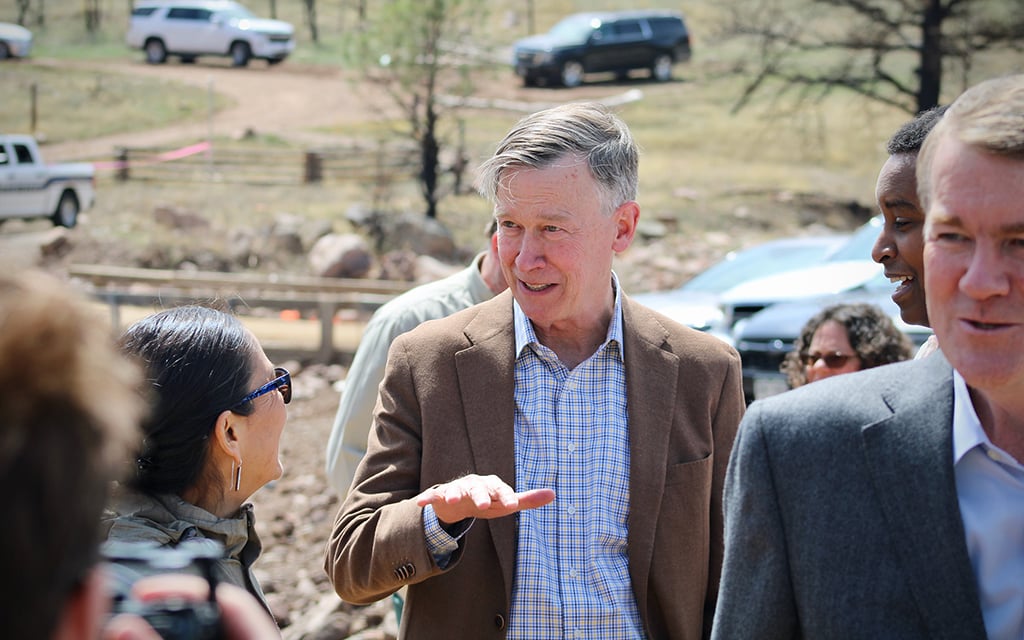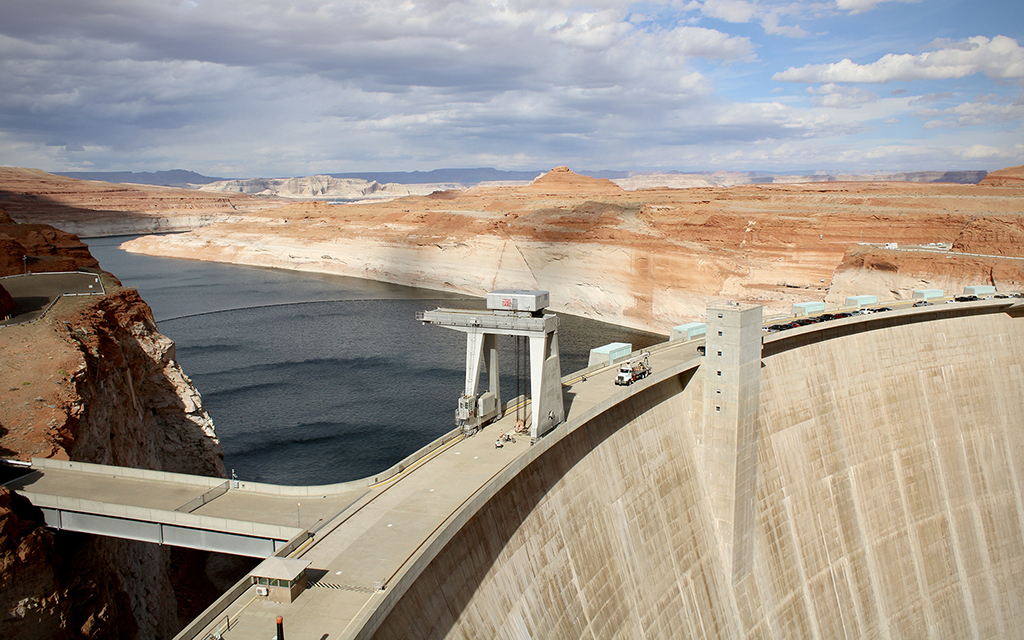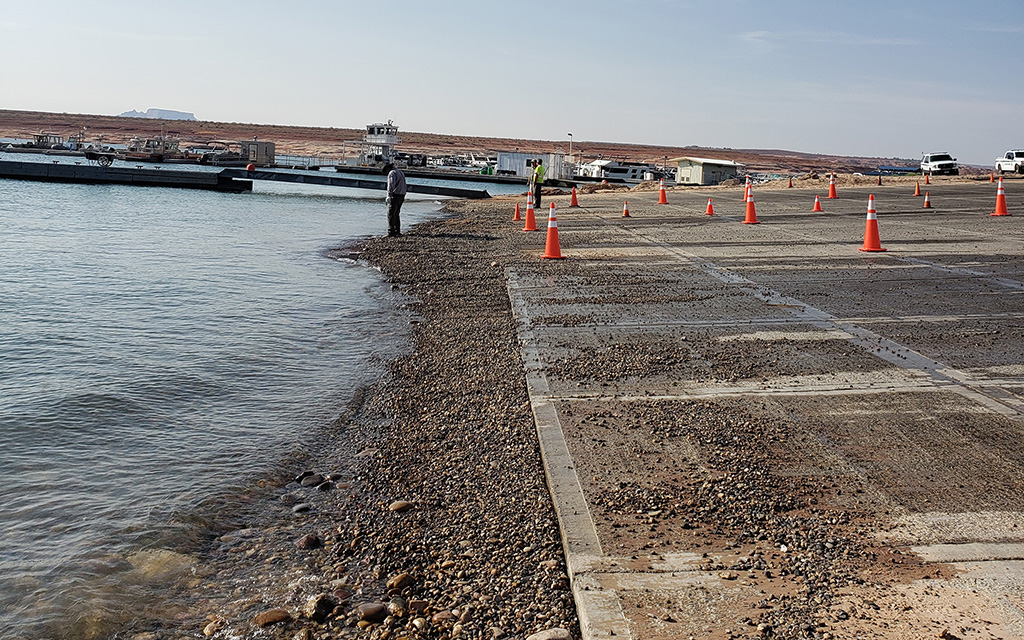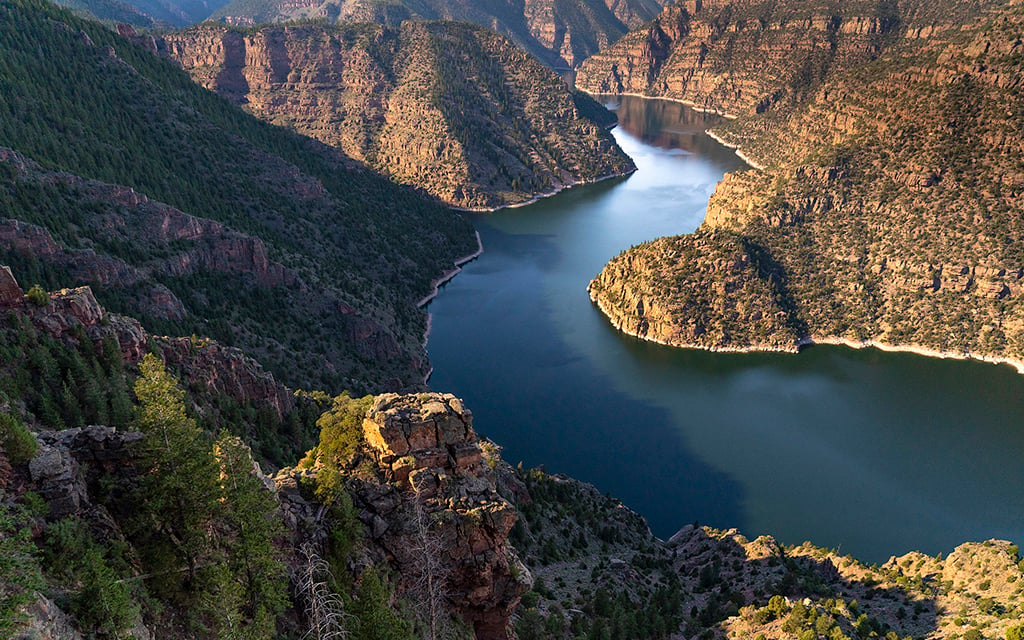
Sen. John Hickenlooper, D-Colo.. speaks with Interior Secretary Deb Haaland and other elected officials in this 2022 file photo. Hickenlooper has convened a group of senators from seven Western states, including Arizona, to discuss the future of the drought-ravaged Colorado River, which supplies water for 40 million people in those states. (Photo by Alex Hager/KUNC)
Senators from the seven Western states in the Colorado River basin have been quietly meeting “for about a year,” to facilitate difficult discussions between the states over the future of the river.
Sen. John Hickenlooper, D-Colo., who spearheaded the caucus, said its goal is “not to take the place of the state water councils or the state governors” who have been wrangling over the future of the drought-ravaged river that supplies water for 40 million people and a multibillion-dollar agricultural industry and generates power for millions more.
“Our role is … really to facilitate and try to create an environment where we can find the right compromise and be able to use collaboration and cooperation in such a way that we create as little hardship, as little sacrifice for the farmers and ranchers of the Colorado River basin as possible,” Hickenlooper said.
Arizona Sens. Kyrsten Sinema and Mark Kelly, both Democrats, have been part of the informal caucus of senators, according to their offices. The Arizona senators also said they have been pushing other efforts to support water conservation and management in the watershed, with both claiming credit for helping get billions in federal funding for drought relief and for the Colorado River basin.
Sinema, who has convened her own advisory council of water experts and stakeholders in Arizona, said it is important to be looking at the problem from a multistate perspective as well.
“We will either work together and succeed with a strong water future or we will fail together,” Sinema said after a meeting of her advisory council last fall, according to a statement from her office.
The caucus meets as a megadrought and climate change have shrunk the amount of water in the Colorado River’s largest reservoirs, and states have struggled to agree on plans to reduce demand. The federal government has historically left water management decisions to the states, but has expanded its role in recent years.
Federal guidance on Colorado River management typically comes from the Bureau of Reclamation. Congress’ role of late has mainly been limited to authorizing funding for water-related infrastructure projects. Reclamation received $4 billion from the Inflation Reduction Act, and laid out plans to spend the bulk of that money on projects in the Colorado River basin.
Hickenlooper said the caucus is unlikely to draw up a federal law that would change water allocations, but could still produce some actionable steps, such as legislation to help states incentivize more efficient water use.
“I’m not looking for the federal government to create some magical law or solve all the problems through federal legal systems,” he said. “We’re really more facilitators.”
Hickenlooper said the caucus is designed to help bridge gaps between states that have been at odds over how to share the Colorado River’s water. Efforts to agree on cutbacks to water use are often hamstrung by the river’s varied users and esoteric legal structure.

The federal government has historically stayed out of Colorado River negotiations, but has expanded its role in recent years to protect its dams and reservoirs, such as Glen Canyon Dam at Lake Powell, which has recently fallen to historic lows. (Photo by Alex Hager/KUNC)
“I think it could be very useful,” said Jeffrey Kightlinger, former general manager of the Metropolitan Water District of Southern California, which supplies Colorado water to greater Los Angeles. “I think it’s something we probably should have done earlier. The Colorado River is in crisis and it is a shared resource among the states. It just makes perfect sense that the states’ elected representatives be talking to each other and trying to find common ground.”
Kightlinger said Congress can be an important player in talks about the future of the river.
“They can hold hearings,” he said, “They can hold (the Department of the) Interior’s feet to the fire if they feel Interior’s moving too slow, and they can help inform the leadership within the states – this is what the legislative branch is saying and what the states should be looking for.”
Reclamation has asked the states for input on plans to reduce the amount of water drawn from the river, as Lake Powell and Lake Mead fall to historic lows, but getting agreement has been tough. Six states presented a proposal last month to reduce releases, but California released its own proposal. The river’s Upper Basin states – Colorado, Wyoming, Utah and New Mexico – often say their Lower Basin counterparts – California, Arizona and Nevada – should be first to take cuts, while growing cities compete with farms, which use about 80% of the river’s water.
Broader discussions about how to share water going forward are largely centered on 2026, when the current guidelines for the river expire and states are expected to draw up new rules.
“I think (Congress) should be gearing up and I think that’s potentially one of the roles this caucus can play, is making sure that the elected leadership is briefed and on board and knowing that the solutions for 2026 are going to have to be large scale and fairly bold and they will need federal support,” Kightlinger said.
But Kelly, speaking in December to the annual Colorado River Water Users Association, told the meeting of Western water officials and experts that states need to take the lead.
“I think it’s better for everyone if the federal government doesn’t make these tough decisions,” Kelly said, according to a statement from his office. “That sentiment is shared by many of my Senate colleagues. No matter what Basin state we represent, we all want water users to take the lead.”
– Cronkite News reporter Alexis Waiss contributed to this report from Washington. This story is part of ongoing coverage of the Colorado River, produced by KUNC in Colorado and supported by the Walton Family Foundation. KUNC is solely responsible for its editorial coverage.

